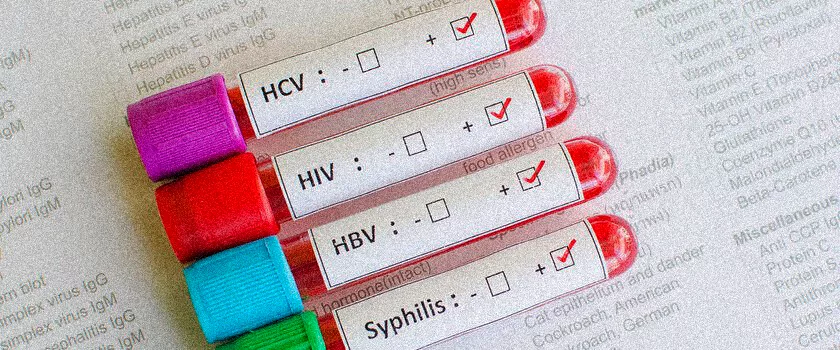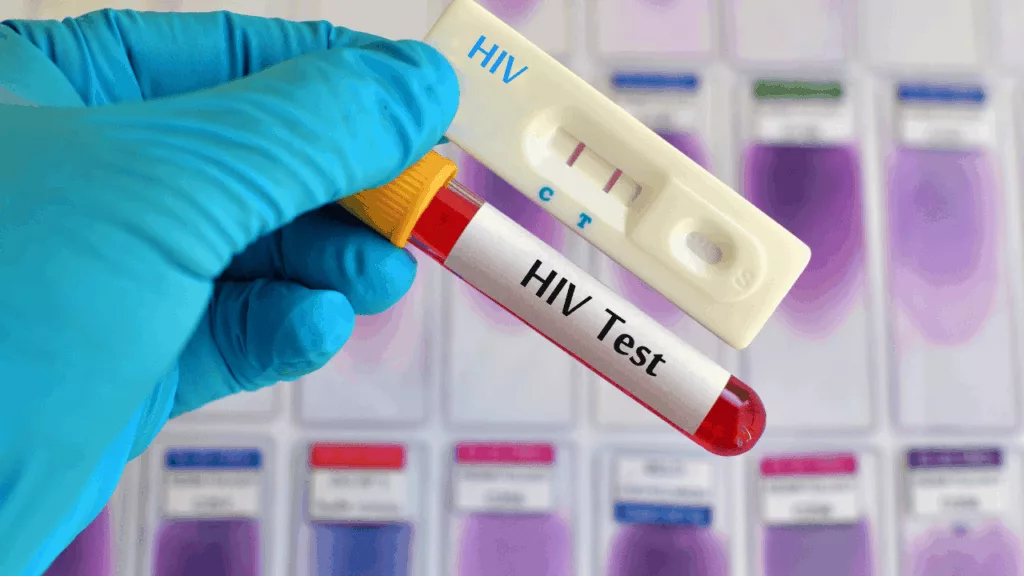Comprehensive STI testing: what you need to know
Testing for sexually transmitted infections (STIs) is an important step in maintaining intimate health and preventing complications. Early detection of infections such as syphilis, gonorrhea, or chlamydia allows prompt treatment and protects both yourself and your partner.
At our clinic, we offer the “Sex Safe” package — a specialized package for those who care about their sexual health. It helps detect common STIs and includes:
For women:
Cervical swab (PCR method) for Chlamydia trachomatis-DNA, Neisseria gonorrhoeae-DNA, Trichomonas vaginalis-DNA, Mycoplasma genitalium-DNA
Blood tests for HBsAg (hepatitis B), HIV 1/2 antibodies + p24 antigen, HCV antibodies (hepatitis C), and syphilis (WR)
For men:
Urine for PCR testing for the same infections
Blood tests for HBsAg, HIV 1/2 antibodies + p24 antigen, HCV antibodies, and syphilis (WR)
The package is suitable for both women and men. Women provide a swab and blood, men provide urine and blood.
To undergo testing, it is necessary to call in advance and schedule an appointment.
Make an appointment for a comprehensive examination for sexually transmitted diseases:
Contents
Highlights
- STIs are sexually transmitted and often develop asymptomatically, increasing the risk of serious complications such as infertility.
- Regular STI testing is crucial for early detection of infections and maintaining intimate health, especially in the context of the growing prevalence of STIs.
- The tests can be taken in public and private medical facilities, and their cost varies from a few dozen to about 459 zl for a full package.
What are sexually transmitted diseases?
STIs are sexually transmitted diseases that are acquired through sexual contact. They can be transmitted through sexual contact, including vaginal, anal, and oral contact, as well as through kissing and contact with the mother during childbirth. Pathogens include bacteria, viruses, fungi, and parasites, as well as sexually transmitted diseases and STDs.
Untreated STIs can cause serious complications. These include infertility, damage to internal organs, and an increased risk of developing cancer. Therefore, it is important to understand the possible consequences of not treating certain STIs and the importance of timely detection and treatment of these diseases.

Why is it important to get tested for STIs regularly?
STIs are often asymptomatic, which is why many people are unaware of their infection. Regular examinations are crucial as they allow for early detection of infection, which significantly reduces the risk of serious complications.
In Poland, a significant increase in STI cases was reported in 2022, including 1990 cases of syphilis and 601 cases of gonorrhea. Regular STI testing is the best way to maintain intimate health and reduce the risk of transmitting STIs to partners. Early detection of STIs can significantly reduce the risk of serious complications.

Treatment of STIs requires a visit to a specialist, as home methods are not effective. Therefore, regular examinations are essential for intimate health and overall well-being.
What are the symptoms of STIs?

Among the most common symptoms of sexually transmitted diseases, including sexually transmitted infections, are the following:
- not typical discharge
- pain in the lower abdomen
- burning sensation during urination
- itching in the intimate area
- purulent discharge from the genitals, indicating a possible infection
In men, Neisseria gonorrhoeae infection often manifests itself with profuse urethral discharge and pain during urination. In women, gonorrhea is usually asymptomatic, which makes it difficult to detect early. Initial symptoms of HIV infection may include fever, headache and joint pain, malaise, swollen lymph nodes, and a rash.
Typical symptoms of syphilis are sores on the genitals, anus, or mouth. Symptoms of genital herpes are blisters that burst and form sores; it can be asymptomatic.
Types of STI testing
Previously:
Diagnostic methods include blood tests, swabs of the affected skin, swabs of the genital mucosa, and others. A blood test for sexually transmitted diseases involves taking blood from a vein by qualified personnel. Many different infections can be diagnosed with a blood test.
After:
Diagnostic methods include:
- blood tests
- smears from skin lesions
- swabs from the mucous membrane of the genital organs
- other
A blood test for sexually transmitted diseases involves taking blood from a vein by qualified personnel. Blood tests can be used to diagnose many different infections.
Previously:
Swabs from the genitals can be used to detect infections such as gonorrhea, chlamydia, and others. Tests available at pharmacies can detect gonorrhea, syphilis, and chlamydia. Diagnosis of HPV, including condylomas, can be done with PCR tests that identify highly ionogenic types of the virus from a swab.
After:
Genital swabs can be used to detect infections such as
- Ehrlichiosis
- chlamydia
- gonorrhea
- syphilis
Diagnosis of HPV, including condylomas, can be performed using PCR tests that detect highly ionogenic types of the virus in a smear.
Molecular tests, such as PCR, are used to detect viral infections, including HPV. The variety of tests available allows for the accurate and rapid detection of many STIs, which is crucial for effective treatment.
Testing for human immunodeficiency virus (HIV)
For the diagnosis of HIV infection, screening tests and tests for antibodies to HIV-1 and HIV-2, as well as tests for the p24 antigen are performed. The efficiency of pharmacy HIV tests is 99.6-99.8%.
A positive HIV test result must be confirmed by a Western blot test and a repeat screening test. The conclusion that there is no HIV infection can be made if the screening test is negative and at least 12 weeks have passed since the risky contact.

Diagnosis of syphilis
Syphilis is detected by serologic tests, including VDRL and IgM/IgG antibody testing. The USR test is the most common screening test for syphilis using cardiolipin as a surrogate antigen. A positive USR test result is first confirmed by VDRL and then by FTA-ABS.
What confirmatory tests are performed in case of a positive syphilis reagent test result? FTA-ABS, TPHA. In case of unclear results, an additional TPHA test is performed, which is a specific hemagglutination test.
False-positive USR test results can be caused by pregnancy, other viral infections, or autoimmune diseases. Therefore, it is important to confirm the results with additional tests.
Detection of chlamydia
Testing for chlamydia can be done using serologic antibody tests or PCR from a swab. The primary methods of diagnosing Chlamydia trachomatis include immunologic tests and isolation of bacteria from cell cultures.
Molecular tests, such as PCR, detect the genetic material of Chlamydia trachomatis bacteria in samples. Immunofluorescence tests (DFA) are used to identify Chlamydia trachomatis in specimens.
Tests for genital herpes
Genital herpes is diagnosed by determining IgM and IgG antibodies in the blood and a viral DNA smear. Serologic testing detects IgG antibodies to HSV-1 and HSV-2 in the blood serum, which is important for diagnosing the infection.
Tests for HSV-1 and HSV-2 may not detect antibodies in the early stages of infection, which usually occurs 1-2 weeks after the onset of symptoms. More than 80% of herpesvirus infections are asymptomatic, which complicates diagnosis and can lead to unknowing transmission of the virus.
Tests for gonorrhea
Gonorrhea can be diagnosed by:
- swab cultures
- PCR test for bacterial DNA
- direct stroke
- selective culture of the environment
- N. gonorrhoeae DNA test
The material for the test can come from a variety of places, including the genitourinary tract, throat, or conjunctival sac.
The presence of Neisseria gonorrhoeae can be diagnosed by a DNA test that identifies its genetic material.
Viral hepatitis B and C
Hepatitis B testing is performed using an antibody test and PCR to assess the presence of the virus. Testing for hepatitis B and hepatitis C may include the determination of hepatitis B antigens and antibodies. For hepatitis B, serologic tests are used to assess the stage of the disease and determine the level of immunity after vaccination.
The appearance of anti-HBs antibodies usually means that the body has successfully overcome the hepatitis B infection or that the person has been vaccinated. Such tests are crucial for proper monitoring and treatment of these chronic infections, which can lead to serious complications.
When should I get tested for STIs?
Sexually active people should regularly monitor their health, even if they have no symptoms, to avoid further problems. Regular check-ups are especially important for sexually active women under the age of 25 and older women who engage in risky sexual behaviors.
In addition, if you suspect an infection, it is recommended to take the test before starting antibiotic treatment. Individuals with active Neisseria gonorrhoeae infection should avoid sexual intercourse until a negative test result is obtained.
It is recommended for people who often change partners and have no security guarantees:
- regular testing for sexually transmitted diseases
- STI testing before assisted reproductive technologies procedures
- testing after close contact with an infected person
Where can I get tested for STIs?
You can get tested for sexually transmitted diseases both in public healthcare facilities and in private laboratories. Counseling and diagnostic centers offer the opportunity to get tested anonymously and without a referral. There are various counseling centers in Warsaw where you can get tested at a time that suits you.
There is also a counseling and diagnostic center in Płock that offers tests for sexually transmitted diseases on certain days of the week. You can also use the services of private laboratories that offer various test packages, which allows you to get results conveniently and quickly.
The cost of STI testing
Prices for online STI tests range from a few tens to about 350 PLN per package. A package of STD tests costs PLN 399 online, while in-patient tests cost PLN 459.
Online tests are slightly more expensive than laboratory tests, mainly because of the technology and courier service. However, the convenience and accessibility of these tests may be worth the extra cost, especially for those who value privacy and comfort.
Bottom line
Regular STI testing is key to maintaining intimate health and preventing serious complications. STIs are often asymptomatic, so many people are unaware of their infection. With regular testing, infections can be detected and treated quickly, which significantly reduces the risk of transmitting the infection to partners.
Remember that intimate health is just as important as general health. Regular checkups are an investment in your health and well-being. Don’t neglect this aspect of your life and encourage others to take care of their intimate health through regular checkups.
Frequently asked questions
STI tests are usually minimally invasive and painless, making them comfortable for the patient. However, it is always recommended to consult a doctor for specific information about a particular test.
It is recommended that sexually active people get tested for STIs at least once a year, and more often if they have multiple sexual partners. Regular testing is crucial for sexual health.
For example, in many counseling and diagnostic centers, you can get tested for STIs anonymously and without a referral.
STI tests cost from a few tens to about 350 PLN per package, depending on the location and type of test. It is important to choose the right offer for your needs.
The most common symptoms of an STI are abnormal discharge, lower abdominal pain, burning sensation during urination, itching in the intimate area, and purulent discharge from the genitals. If you experience these symptoms, it is important to consult a doctor.